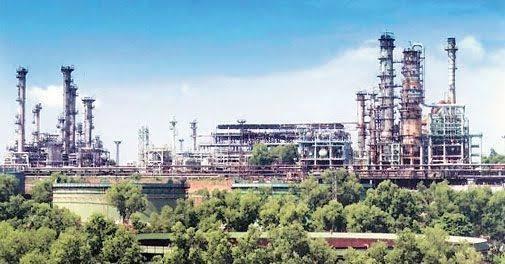Disinvestment Drive: Assam’s Concerns over Numaligarh Refinery Heard, Kerala’s Neglected

With listing of five more public sector units (PSUs), the Centre has come close to its disinvestment target of Rs 1.05 lakh crore—of giving away the national assets to private companies for the financial year of 2019-20. On Wednesday, the Centre has given in-principal approval for the strategic disinvestment of Bharat Petroleum Corporation Limited (BPCL), Shipping Corporation of India, Container Corporation of India, Tehri Hydro Power Development Corporation (THDCIL) and North Eastern Electric Power Corporation Limited (NEEPCO).
Government’s shares in these companies will be brought down to below 51% along with the transfer of management control. THDCIL and NEEPCO will be taken over by NTPC, which is also scheduled to be privatised. Centre has 74.23% stakes in THDCIL and 100% in NEEPCO. Centre’s stakes in BPCL and Shipping Corporation are 53.29 % and 63.75% respectively. Along with this, it will be giving away 30.8% of its stakes in Concor, retaining only 24%.
However, Numaligarh refinery of BPCL will be kept out from the disinvestment process.
“In the case of BPCL, the strategic disinvestment will be for BPCL minus Numaligarh refinery,” said finance minister Nirmala Sitharaman while briefing about the decisions of the Cabinet.
The disinvestment drive has already invited much flak from the masses including employees, unions and associations within various PSUs.
BPCL has four refineries in Mumbai, Kochi (Kerala), Bina (in Madhya Pradesh) and Numaligarh (in Assam) with combined capacity of converting 38.3 million tonnes of crude oil into fuel. Of these, Numaligarh has been exempted as per the request of the state.
Assam Chief Minister Sarbananda Sonowal of BJP had written to the Bharatiya Janata Party-led Centre, detailing the concerns of the state over the Numaligarh refinery. Interestingly, the demands of the Kerala government, which has been opposing the privatisation of PSUs, have not been considered. Kerala Chief Minister Pinarayi Vijayan had also reached out to the Centre with similar concerns—which seem to be neglected now.
“PMO should explain this bias,” said B Balagoplan of Petroleum Employees Association in Kochi refinery, while talking to NewsClick.
Read More: Disinvestment of BPCL: Global Energy Giants Eye Indian Market
The Kochi refinery had started functioning in 1963 with the state government acquiring 350 acres of land for the company. The company, which had formally been registered as Cochin Refinery Limited, was acquired by the BPCL only in 2006.
“State government has 5% stake in Kochi Refinery alone and when it comes to overall BPCL shares, it is 0.8%,” said Balagopalan.
The Kochi refinery gets a tax exemption of Rs 100 crore every year from the state government since it is a public sector entity. Along with this, the state government ensures availability of water from the nearby areas including Piravom and Aluva to the refinery for a meagre tariff.
As the refinery goes to private entities, it would be curtailing the efforts of the state government for a petrochemical park. The ambitious project is proposed for petrochemical downstream products in 481 acres of land of FACT in Ernakulam. The Rs 10,000-crore park is expected to provide opportunities to one lakh youths.
Every year, Kochi refinery produces two lakh tonne of bitumen and once the refinery is privatised, it would affect the availability of bitumen in the state. Also, the refinery produces natural rubber-modified bitumen, especially to help the rubber farmers, even though it is not quite profitable.
So, the unions and associations and the government fear that the private players who would take over the refinery would not be producing the natural rubber-modified bitumen, in turn affecting the rubber farmers.
The privatisation of BPCL will also affect its joint ventures including Petronite at Kannur international airport and LNG; these two will be completely controlled by the private company. It is also feared that the state-owned public enterprises like FACT and HOC will also have to deal with unavailability of raw materials once BPCL is privatised.
There are around 3,000 permanent employees in Kochi refinery and around 10,000 contractual workers in the Kochi refinery. In terms of total human resource assets, BPCL has around 12,000 permanent workers and around 20,000 contractual workers who are regularly engaging in the works of the company.
Coming back to BPCL, it has a vast storage capacity with 77 major installations and depots for storage and distribution of petroleum products, 55LPG bottling plants, 2241 KM multi product line, 56 aviation fuelling stations in airports, four lubricant plants and lubricant godowns and facilities for unloading and loading of crude. Moreover, the PSU has 11 subsidiary companies within India and abroad, 22 joint venture companies and also share holdings in various companies.
BPCL, which was awarded the ‘maharatna’ status in 2017, has been making profits since its inception with a large contribution to national exchequer every year by way of dividend, direct and indirect taxes, etc.
Net profit earned by BPCL during the financial years 2014-15, 2015-16, 2016-17, 2017-18 and 2018 has been Rs 5,085 crore, Rs 7056 crore, Rs 8039 crore, Rs 7976 crore and Rs 7138 crore respectively. More than Rs 15,000 crore have also been paid as dividend during the last four financial years. In the last financial year, the taxes paid to the national exchequer by BPCL were around Rs 96,000 crore.
Along with this, BPCL has a reserved and surplus to the tune of Rs 34,400 crore. Based on a rough calculation, the real value of the assets of BPCL will be more than two lakh crore rupees with large amount of plots in the hearts of the prime cities across the country.
Today, more than 75% of the Indian fuel marketing business is owned by three PSUs—BPCL, HPCL and IOCL. BPCL alone has more than 24% market share in the petroleum products marketing in India. So, the unions and associations point out, once these PSUs are privatised, the private companies will control the Indian fuel market as per their accord and it will be a complete surrender to the private companies.
Read More: Decision to Privatise BPCL and HPCL ‘Suicidal’, Workers to Strike Work on Nov 28
Get the latest reports & analysis with people's perspective on Protests, movements & deep analytical videos, discussions of the current affairs in your Telegram app. Subscribe to NewsClick's Telegram channel & get Real-Time updates on stories, as they get published on our website.
























